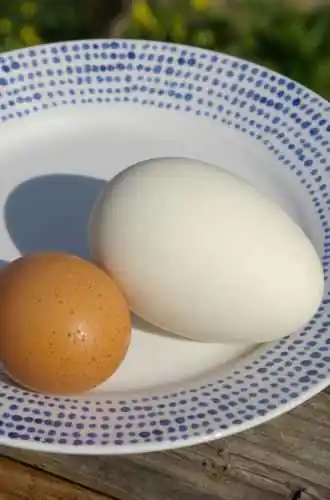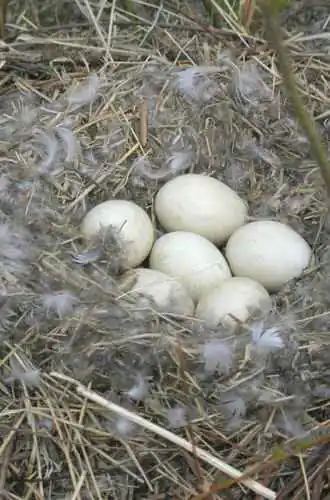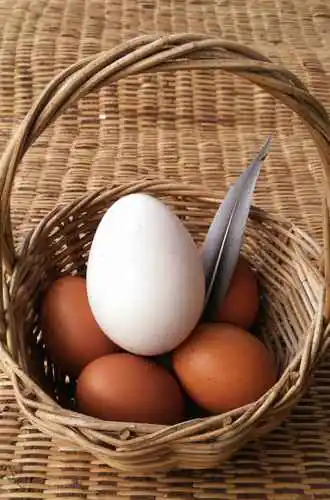Geese usually lay an egg every one or two days until they have a clutch size of around 2-10 eggs. They lay their eggs just after their breeding season.
Once all of the eggs have been laid, females often become broody and start incubating the eggs until they hatch in 28 to 30 days.
Do Geese Lay Eggs All Year Round?
Geese are seasonal layers and typically lay eggs between February and May, which is their laying season. Outside of this egg-laying period, geese do not produce eggs.
Geese require a specific amount of daylight to stimulate egg production. The goose will not lay an egg if there is not enough daylight during the winter months.
A goose egg is often considered highly seasonal because of this.
Can Geese Lay Eggs Twice in a Season?
Generally no, wild geese do not lay eggs twice in a season.
They lay only one clutch per laying season and will not lay an egg until the following year. It takes a lot of energy for a mother goose to lay an egg, so they can only do it once per season.
However, if their eggs are destroyed or removed, or if they have to abandon their nest then they will re-lay eggs. For this reason, it is not recommended to destroy geese eggs on your property if you are trying to get rid of geese.
Do Geese Lay Unfertilized Eggs?
Female geese are part of a family of female birds that don’t need any males to lay eggs.
This means that geese can lay eggs without a male goose or gander present. These eggs will not be fertilized and will not hatch into goslings.
A female goose will incubate an unfertilized egg and stay on it for around a month.
Usually, a clutch of goose eggs is a mix of fertilized and unfertilized ones.
Once the first eggs hatch into goslings, the female goose will abandon the rest of the clutch to be with her goslings. Both parents will take care of and protect their young.
Most of the time, these abandoned eggs would become a food source for other animals such as raccoons and snakes.
Are Backyard Geese Raised for Egg Production?
No, backyard geese are not typically raised for egg production, however, some specific breeds are. While they may lay a few eggs each year, their primary purpose is as a source of meat.
Many cultures consider goose meat a delicacy, so these birds are usually reserved for special occasions.
If you’re looking to raise backyard poultry for eggs, chickens and ducks are better options than domestic geese. Ducks and chickens lay far more eggs than geese, making them a more reliable source of this product.
Due to selective breeding, a Chinese goose may lay around 40 eggs in a season, but it is not ideal for inexperienced farmers and egg producers. Chinese geese are loud and often aggressive.

When Do Geese Start Laying Eggs?
The average age for a female goose to start laying eggs is between two and four years old. However, some female geese may start laying eggs as early as 9 months old to one year old.
How Many Eggs Do Canada Geese Lay in a Year?
Canada geese lay between two and nine eggs each year, usually after their breeding season or mating season in early spring.
The eggs are laid early in the morning and the number of eggs laid depends on the age of the goose, with older geese generally laying fewer eggs than young geese.
Canada geese typically mate for life, and will often return to the same nesting sites year after year.
At What Time of the Day Do Geese Lay Their Eggs?
Geese are interesting creatures. Unlike most birds, they mate for life and often raise their young together. They are also very protective of their nest.
Geese lay their eggs in the morning. The female will carefully select a nesting site, often near water, and line the nest with soft materials like grasses or feathers.
Once the eggs are laid, the female will incubate them while the male goose or gander stands nearby.
Where Do Geese Lay Their Eggs?
Wild geese typically lay their eggs on the ground near water. The female goose will build a nest out of the grass, feathers, and down. She will line the nest with her own body to keep the eggs warm.

The Bottom Line on Geese’s Laying Habits
Geese lay one egg every one to two days in their nest sites, usually after the mating period starts. Once the clutch is complete which is usually in late winter into early summer, the incubation period can take 28 to 30 days for lighter breeds.
In some cases, especially with larger breeds, it might even take 35 days.
Geese are raised and domesticated for their meat rather than for their eggs. Some geese have been selectively bred to produce more eggs and even so, they don’t lay as many eggs as other birds.
FAQs on Goose egg
Are Goose Eggs Bigger Than Duck Eggs?
Yes, they are bigger. A goose egg is equal to two duck eggs. However, a goose egg has a lot more in common with a duck egg than a chicken egg. Both have higher amounts of nutrients and a much thicker egg white.
Are Geese Eggs Bigger Than Chicken Eggs?
Yes, goose eggs are bigger than chicken eggs. A goose egg usually equals three chicken eggs. Moreover, they taste different too.
Goose eggs taste more like duck eggs. They are richer and have more egg taste than hen eggs. Depending on your eating habits, you may either like or dislike them.

Do Chickens Lay Eggs Every Day?
Chickens typically lay a single egg per day, although this can vary depending on the chicken’s age and health. Some chickens may lay more than one egg per day, while others may not lay anything for a few days or even weeks.
Do Ducks Lay Eggs Every Day?
Ducks will generally lay an egg per day during their laying season. Some ducks may lay more than one egg per day while others may take a break in between laying sessions.


